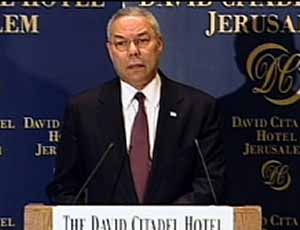| " He also reiterated calls for Arafat
to "dismantle the terrorist infrastructure and stop incitement."
"In my meetings with Chairman Arafat, I
made it clear that he and the Palestinian Authority can no longer equivocate,"
Powell said. "They must decide, as the rest of the world has decided, that
terrorism must end. Chairman Arafat must take that message to his people."
Powell also said Israel should decide "whether
the time has come.. to look beyond the destructive impact of settlements
and occupation, both of which must end, consistent with the clear positions
taken by President Bush." (Transcript of Powell's
speech)
A three-part "comprehensive strategy" is
needed to solve the Middle East crisis, Powell said. It includes security
and freedom from terror and violence for Israelis and Palestinians; serious
and accelerated negotiations; and economic and humanitarian assistance
for the Palestinian people.
Powell said U.S. Assistant Secretary of
State William Burns will remain in the region and U.S. Middle East envoy
Anthony Zinni will return. Powell said he would come back himself, but
he gave no timetable. A senior U.S. official, however, said Powell planned
to return to the region "next month."
The United States will resume security
contacts with the Palestinian Authority to "restore effective security
cooperation between Israelis and Palestinians," Powell said, adding that
Bush was willing to send CIA Director George Tenet to the region to work
with both sides on the issue.
Addressing the Israeli military operation
in the West Bank, Powell said, "I stressed to [Israeli Prime Minister Ariel
Sharon] the urgency of completing withdrawal, and have been assured of
real results in the next few days."
In a speech at Virginia Military Institute
on Wednesday, Bush thanked Powell for his "hard work at a difficult task"
and said the secretary of state had made "progress toward peace."
Arafat defiant after Powell meeting
CNN's Andrea Koppel, traveling with the
secretary's delegation, said Powell looked grim as he came out of the meeting
with Arafat, who charged that Israel has not truly withdrawn from West
Bank cities like Tulkarem and Qalqilya. He said Israeli forces had come
back to Tulkarem on Tuesday. He also demanded the international community
end his isolation.
After the meeting ended, Powell stood silently
in a doorway with chief Palestinian negotiator Saeb Erakat, who later said
Sharon had ''scuttled'' Powell's trip.
Behind them in a darkened hallway, Arafat
could be heard by reporters saying, "Is it acceptable that I can't go out
of the door?"
The U.S. delegation has tried to secure
a cease-fire commitment from Arafat and the surrender of men in his besieged
compound who Israel says are behind the assassination last October of Israeli
Tourism Minister Rechavam Ze'evi.
It also wants Arafat to hand over Fouad
Shobaki, a top Palestinian official the Israelis believe is responsible
for the attempted smuggling of weapons on the ship Karine-A earlier this
year.
Sharon has said Israeli troops will stay
in Ramallah until the men give up. The Palestinians have said they will
not negotiate until Israeli troops pull out of the West Bank towns and
areas they began entering on March 29.
Israeli minister denies Jenin massacre
Meanwhile, Israeli Defense Minister Benjamin
Ben-Eliezer said Wednesday that "no more than 45" Palestinians died in
fighting at the refugee camp in the West Bank town of Jenin. Palestinian
officials have charged that Israeli troops killed more than 500 Palestinians
at the camp and buried many of them in mass graves.
"We never massacred people," Ben-Eliezer
said in an interview with CNN. He defended the conduct of his country's
armed forces in Jenin, which he called the "capital of the terror." (Full
story)
In Bethlehem, the fighting continued as
gunfire was reported Tuesday night outside the Church of the Nativity in
Bethlehem, West Bank. About 200 Palestinians are taking refuge in the church,
including 30 that Israel says are terrorists.
Palestinian security sources said Israeli
Defense Forces (IDF) soldiers had thrown what were believed to be tear
gas grenades inside the south entrance of the church, at the Franciscan
Monastery. They said the area was on fire, with IDF forces firing with
machine guns.
The IDF said its troops were conducting
operations in the area and said the shooting was coming from a number of
sources. It said it had not entered the church and was not attacking it.
Sharon said Monday that Israel had agreed
with the U.S. on a plan to end the standoff at the church. However, a U.S.
official said Tuesday night that the plan was "not going well."
Under the plan, the Palestinians would
give up their weapons. Those whom Israel has not accused of terrorist activity
would be freed. Those Israel has accused of terrorism would have the choice
of facing trial in Israel or accepting exile for life in another country.
Israel began its West Bank military operation
on March 29. Sharon has said the operation will end when the Israeli military
has rooted out what he calls the "terrorist infrastructure." Palestinians
have accused Israel of trying to reoccupy the West Bank.

|
